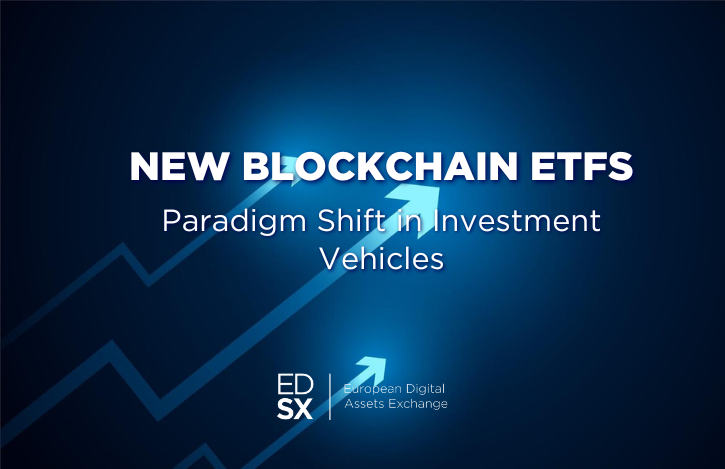In the ever-evolving landscape of financial markets, a new trend is emerging at the intersection of traditional Exchange-Traded Funds (ETFs) and the innovative realm of cryptocurrencies: the tokenization of ETFs. This groundbreaking concept involves representing conventional ETFs as crypto tokens traded on blockchain platforms, ushering in a wave of potential transformations within the investment sphere.
The Rise of Tokenization in ETFs
Tokenization has been gaining momentum in recent years, presenting a novel approach to enhancing the accessibility and efficiency of ETFs. Advocates of this paradigm shift highlight a myriad of benefits, including 24/7 trading capabilities, same-day settlement processes, and cost advantages for investors. Moreover, tokenization holds the promise of democratizing access to assets traditionally deemed inaccessible, such as real estate and commodities.
While the potential advantages are apparent, significant hurdles stand in the path of widespread adoption. Regulatory uncertainty, liquidity challenges, and operational complexities pose formidable barriers to the mainstream integration of tokenized ETFs. However, despite these obstacles, several industry leaders are venturing into the realm of tokenization, aiming to revolutionize the ETF market as we know it.
Industry Leaders Exploring Tokenization
Traditional ETF issuers like WisdomTree and Franklin Templeton are actively exploring tokenization as a means of adapting to changing investor preferences and technological advancements. Concurrently, crypto-native firms are spearheading the development of blockchain-based funds. They seek to leverage the transformative potential of tokenization in reshaping the investment landscape.
The recent approval of the Bitcoin ETF marks a pivotal moment in the trajectory of ETF evolution. With regulatory barriers gradually being dismantled, it is increasingly likely that major funds will pivot from issuing Exchange-Traded Products (ETPs) to embracing tokenized ETFs. This shift reflects the growing acceptance of cryptocurrencies within mainstream finance. However, it also underscores the seismic changes underway in the realm of investment vehicles.
ETPs, encompassing a diverse array of financial instruments such as ETFs, Exchange-Traded Notes (ETNs), and Exchange-Traded Commodities (ETCs), have long provided investors with opportunities to diversify their portfolios and access various asset classes. However, the advent of tokenized ETFs represents a quantum leap forward, offering unparalleled flexibility, efficiency, and accessibility.
Comparing ETFs, ETNs, ETCs, and ETPs
Here’s a breakdown of the key differences between ETFs, ETNs, ETCs, and ETPs:
- ETFs (Exchange-Traded Funds): Actively managed or passively tracked funds, typically holding a portfolio of assets like stocks, bonds, or commodities, trade throughout the day on stock exchanges. Thereby, offering intraday liquidity and transparent pricing.
- ETNs (Exchange-Traded Notes): Debt securities issued by financial institutions track the performance of an underlying index or asset. They do not hold assets directly. Instead, investors are exposed to the credit risk of the issuer, while offering exposure to various asset classes. This includes equities, commodities, and currencies.
- ETCs (Exchange-Traded Commodities): Securities representing ownership in commodities like gold, silver, or oil, allow investors to gain exposure to commodity prices without owning physical assets. They’re traded on stock exchanges like ETFs, providing liquidity and price transparency.
- ETPs (Exchange-Traded Products): Encompassing a broader category of investment vehicles, including ETFs, ETNs, and ETCs, they offer investors access to diverse asset classes traded on exchanges like stocks. Providing flexibility, liquidity, and cost-effectiveness, they serve as valuable tools in building investment portfolios.
Navigating the Future of Tokenized ETFs
As the industry navigates the complexities of integrating tokenized ETFs into existing frameworks. Key considerations such as regulatory compliance, technological infrastructure, and market dynamics will undoubtedly shape the trajectory of this transformative innovation. While challenges persist, the potential for new blockchain ETFs to redefine the contours of modern finance is undeniable. Therefore, heralding a new era of democratized, digitally-native investment solutions.
In conclusion, the revolutionary capabilities of blockchain technology will redefine the future of investment vehicles by converging with traditional ETFs. Major funds are increasingly experimenting with tokenization. Consequently, they set the stage for a paradigm shift. This shift promises to democratize access, enhance efficiency, and unlock new avenues of growth within the global financial ecosystem.

Based in Zug, the platform is fully compliant with all Swiss laws related to financial intermediaries, banking, anti-money laundering, and organized trading facilities. Among its core values, there are innovative solutions through blockchain technology, which ensures security and liquidity.
EDSX is the first platform in Europe with primary and secondary markets for both institutional and retails. EDSX is a pioneering platform that employs the world’s leading technology to globally list security tokens in both primary and secondary markets, listing digital securities of real financial instruments to the public with a decentralized peer-to-peer exchange. Our goal is to fully engage every aspect of the financial revolution.
Do you have a question for us?
Send your query here:
[email protected]

